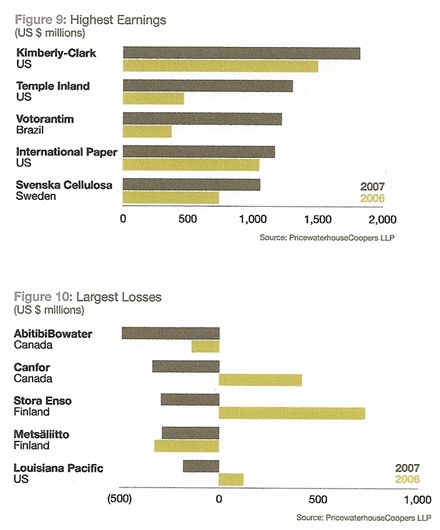Report Compares Canadian Forest Company Performance with World Counterparts
By 250 News
Thursday, July 24, 2008 04:01 AM

Price Waterhouse Coopers LLP graphs of the winners and losers among the world's Forest Products businesses
Prince George, B.C. – While the major publicly traded forest companies are getting set to release their second quarter results, a new report by Price Waterhouse Coopers has pegged Canada’s Forest companies at the bottom of the list of world wide performers.
The report looks at the 2007 returns, and to no surprise, says Canadian forest companies had the lowest returns when compared to their counterparts in other parts of the world.
In 2007 when it came to return on capital employed (ROCE) Canadian companies finished with a total -0.1% that’s down from the 2% recorded in 2006. The report says that return reflects “the extent of the crisis in the Canadian industry...
The strong dollar and US housing market slump have combined to hammer operating margins of Canadian producers, leading to many capacity closures.”
The study tallies the combined net losses for the 13 Canadian companies surveyed as $1.1 billion, up from $166 million in 2006. Those figures include Canfor and AbitibiBowater whose losses totalled $827 million last year. The Canfor losses were mainly because of write downs while AbitibiBowater's losses were impacted by facility closures.
The report’s predictions for the immediate future is mixed. The report says the industry will continue to be impacted by the U.S. Dollar and the mountain pine beetle “The immediate outlook for the Canadian forest products industry remains poor, as it waits the turning point in US markets. Looking forward, the accelerated impact of mountain pine beetle infestation in British Columbia on harvest levels could tighten wood supplies, and hence prices, sooner than had been predicted.”
Previous Story - Next Story
Return to Home











